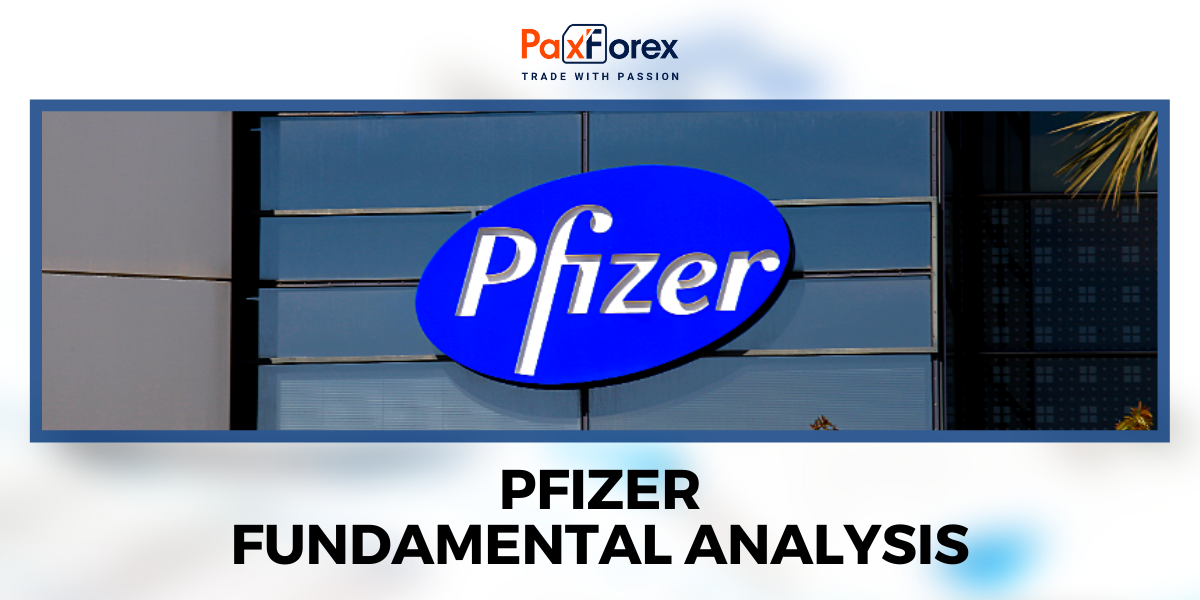
Source: PaxForex Premium Analytics Portal, Fundamental Insight
A year ago, Pfizer enjoyed significant success in the market, achieving remarkable sales due to its COVID-19 products. However, as the World Health Organization (WHO) no longer considers the pandemic a global health crisis, this particular market has become significantly less profitable for the pharmaceutical giant.
Consequently, Pfizer's shares have already declined by 21% year to date, despite a general recovery in broader equities following a downturn. The market tends to anticipate future developments, suggesting that Pfizer's prospects may not be as attractive as they once were. However, it's also possible that the market isn't fully considering the potential of Pfizer's current position, and the company could be undervalued at its current levels.
So, which scenario is more likely? Let's delve deeper to find out.
In January, Pfizer CEO Albert Bourla made a significant statement, declaring that the company was entering a crucial phase in its history. Bourla's emphasis was on the 18-month period leading up to the middle of the following year. However, he wasn't referring to the company's financial performance, as Pfizer's sales in the first quarter had declined by 29% compared to the previous year, amounting to $18.3 billion.
Bourla's assertion was focused on Pfizer's plan to secure an impressive 19 new approvals by the end of next year, a significant increase compared to its usual launch of one or two new products annually. The company is currently undergoing a transitional period that is impacting its financial results. This is a common occurrence for pharmaceutical companies, often happening when they face biosimilar competition due to patent cliffs. We can observe a similar situation with AbbVie, which has recently encountered challenges from biosimilars for its blockbuster immunology medicine, Humira. However, Pfizer's case differs. Last year, the company achieved a record-breaking revenue of $100.3 billion, largely due to its portfolio of coronavirus-related products. As comparisons to the peak pandemic years fade, this market is expected to stabilize, leading to renewed revenue growth for Pfizer.
In the first quarter, Pfizer's non-coronavirus revenue showed a respectable operational year-over-year increase of 5%. The company anticipates generating non-COVID revenue between $70 billion and $84 billion by 2030, resulting in a compound annual growth rate of 6% to 10% during that period. It's worth noting that Pfizer made this projection prior to its recent acquisition announcement. On March 13, the company revealed its plan to acquire cancer specialist Seagen for $43 billion.
This acquisition is expected to contribute $10 billion in risk-adjusted revenue by 2030, according to Pfizer's management. Additionally, Pfizer will gain access to Seagen's robust oncology pipeline, as Bourla stated, "We are not buying the golden eggs. We are acquiring the goose that is laying the golden eggs." Consequently, after a year or two of declining sales, Pfizer's future appears promising.
The current focus of the market on Pfizer's short-term challenges presents an excellent opportunity for investors to enter the market while its shares are experiencing a decline. As of now, Pfizer's forward price-to-earnings (P/E) ratio stands at only 11.6, whereas the broader pharmaceutical industry has an average forward P/E of 14.9. This indicates that Pfizer is attractively valued according to this widely used metric.
Apart from its favorable valuation and long-term growth potential, Pfizer is also an outstanding dividend stock. With a dividend yield of 4.09%, it offers a yield that is more than double the average of the S&P 500. Pfizer has a consistent track record of raising its dividends, with payouts increasing by nearly 70% over the past decade. Furthermore, the company's cash payout ratio is currently at a modest 45%, leaving ample room for further dividend hikes.
Pfizer has generated substantial cash flow, primarily due to its success in the coronavirus market. While a significant portion of this cash has been allocated to funding acquisitions, the company is expected to continue rewarding shareholders with increased payouts. These factors make Pfizer an appealing choice for investors seeking income.
Although Pfizer's stock may face temporary pressure as its revenue continues to decline on a year-over-year basis, investors with a time horizon of five years or more can confidently consider purchasing the company's shares. Pfizer's top-line performance will rebound and regain momentum once comparisons to its record-breaking sales year (last year) become less relevant and as it introduces new products to its portfolio.
Combined with Pfizer's solid dividend profile, these factors contribute to the stock's attractiveness, particularly at its current levels.
As long as the price is above 38.00, follow the recommendations below:
- Time frame: D1
- Recommendation: long position
- Entry point: 38.64
- Take Profit 1: 40.00
- Take Profit 2: 42.00
Alternative scenario:
If the level of 38.00 is broken-down, follow the recommendations below:
- Time frame: D1
- Recommendation: short position
- Entry point: 38.00
- Take Profit 1: 37.00
- Take Profit 2: 36.00













